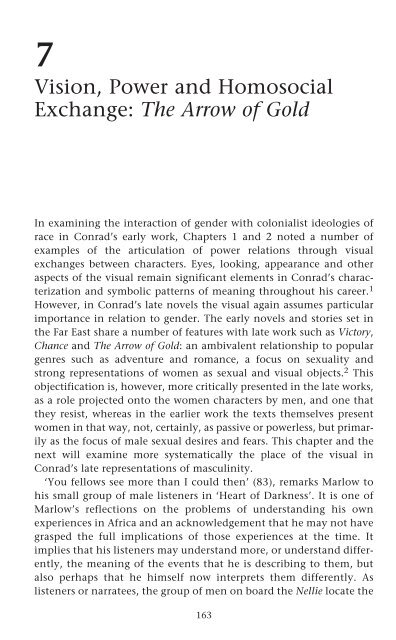Conrad and Masculinity
Conrad and Masculinity
Conrad and Masculinity
You also want an ePaper? Increase the reach of your titles
YUMPU automatically turns print PDFs into web optimized ePapers that Google loves.
7<br />
Vision, Power <strong>and</strong> Homosocial<br />
Exchange: The Arrow of Gold<br />
In examining the interaction of gender with colonialist ideologies of<br />
race in <strong>Conrad</strong>’s early work, Chapters 1 <strong>and</strong> 2 noted a number of<br />
examples of the articulation of power relations through visual<br />
exchanges between characters. Eyes, looking, appearance <strong>and</strong> other<br />
aspects of the visual remain significant elements in <strong>Conrad</strong>’s characterization<br />
<strong>and</strong> symbolic patterns of meaning throughout his career. 1<br />
However, in <strong>Conrad</strong>’s late novels the visual again assumes particular<br />
importance in relation to gender. The early novels <strong>and</strong> stories set in<br />
the Far East share a number of features with late work such as Victory,<br />
Chance <strong>and</strong> The Arrow of Gold: an ambivalent relationship to popular<br />
genres such as adventure <strong>and</strong> romance, a focus on sexuality <strong>and</strong><br />
strong representations of women as sexual <strong>and</strong> visual objects. 2 This<br />
objectification is, however, more critically presented in the late works,<br />
as a role projected onto the women characters by men, <strong>and</strong> one that<br />
they resist, whereas in the earlier work the texts themselves present<br />
women in that way, not, certainly, as passive or powerless, but primarily<br />
as the focus of male sexual desires <strong>and</strong> fears. This chapter <strong>and</strong> the<br />
next will examine more systematically the place of the visual in<br />
<strong>Conrad</strong>’s late representations of masculinity.<br />
‘You fellows see more than I could then’ (83), remarks Marlow to<br />
his small group of male listeners in ‘Heart of Darkness’. It is one of<br />
Marlow’s reflections on the problems of underst<strong>and</strong>ing his own<br />
experiences in Africa <strong>and</strong> an acknowledgement that he may not have<br />
grasped the full implications of those experiences at the time. It<br />
implies that his listeners may underst<strong>and</strong> more, or underst<strong>and</strong> differently,<br />
the meaning of the events that he is describing to them, but<br />
also perhaps that he himself now interprets them differently. As<br />
listeners or narratees, the group of men on board the Nellie locate the<br />
163




